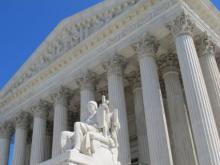WASHINGTON – In the second day of oral arguments, a majority of Supreme Court justices expressed skepticism that one of the central tenets of the Affordable Care Act – the requirement that Americans have minimum health insurance coverage – is constitutional.
But at least two justices – Chief Justice John Roberts and Justice Anthony Kennedy – also were dubious about the challengers’ assertion that requiring Americans to buy insurance was an unprecedented act that exceeded Congress’ powers under the U.S. Constitution’s commerce clause.
The apparent rift leaves an open question as to whether the justices will uphold or strike down the so-called individual mandate when they render their decision in late June.
The federal government contends that it can require most Americans to buy health insurance – or pay a penalty if they don’t – because those who go without insurance shift the cost of their care onto those who have coverage. The idea is that their "inactivity" affects a substantial portion of U.S. commerce, and thus can be regulated under the commerce clause, U.S. Solicitor General Donald B. Verrilli Jr. argued.
Many of the justices, though, hammered away at Mr. Verrilli, asking him to explain how the Affordable Care Act (ACA) could be considered constitutional.
And, they said, allowing the ACA to stand could result in the expansion of federal powers. If the federal government can compel Americans to buy insurance with the idea that they might need it someday, it could also compel Americans to purchase cell phones so they could make 9-1-1 calls to access government-provided fire and ambulance services, Justice Roberts said.
If the individual mandate – or the whole health reform law – is struck down, it could mean millions of Americans would continue to be uninsured and would directly affect physicians’ practices, said Dr. Jack Lewin, CEO of the American College of Cardiology, in an interview.
"It’s largely a negative thing for doctors and for the country if the law is struck down," Dr. Lewin said. The ACA "expands access to 35 million people who right now have the emergency room as their medical home."
If the law is upheld, Dr. Lewin said, "the nation still has a need for additional policy and legislative action to more emphatically and clearly address delivery system reforms," as well as "payment reforms that will actually reduce the rate of cost increase."
Neal K. Katyal, a Georgetown University law professor who observed the arguments said that it was too soon to speculate on the outcome.
"I would caution anyone from reading anything into the [justices’] questioning," he said in an interview.
Justice Roberts noted that the federal government is "supposed to be a government of limited powers. If the government can do this, what else can it not do?"*
Justice Antonin Scalia called "extraordinary" Mr. Verrilli’s assertion that requiring insurance or payment of a penalty was within congressional taxing powers. Justice Scalia said that following the government’s logic, Congress could require people to exercise, or "make people buy broccoli."
Paul Clement, an attorney for the challengers (26 states and the National Federation of Independent Business), said that the government shouldn’t be allowed to force people to purchase something they don’t want.
Mr. Clement illustrated his point with the federal effort to support the U.S. auto industry during the 2009 recession.
"When we had problems in the automobile industry" instead of saying "everybody over $100,000 has to buy a new car" the federal government came up with an incentive program – Cash for Clunkers, he pointed out.
Justice Roberts, though, noted that the government is arguing that all Americans already participate in the health care market, which "makes it very different than the market for cars or the other hypotheticals."
Justice Kennedy said that if the court upholds the government’s contention that the insurance market is unique, "in the next case, [the government] will say the next market is unique." He acknowledged, though, that in some ways health care is different. "The young person who is uninsured is uniquely proximate to affecting the rates of insurance and the costs of providing medical care in a way that is not true in other industries," said Justice Kennedy. "That’s my concern in the case."
*Correction 3/27/12: Justice Roberts' quote was attributed incorrectly in a previous rendition.


